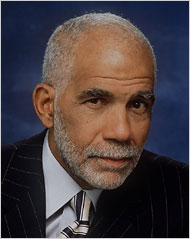Nov 23, 2006 01:13 PM
| Associated Press photo |
NEW YORK (AP) -- Cell phone owners will be allowed to break software locks on their handsets in order to use them with competing carriers under new copyright rules announced Wednesday.
Other copyright exemptions approved by the Library of Congress will let film professors copy snippets from DVDs for educational compilations and let blind people use special software to read copy-protected electronic books.
All told, Librarian of Congress James H. Billington approved six exemptions, the most his Copyright Office has ever granted. For the first time, the office exempted groups of users. Previously, Billington took an all-or-nothing approach, making exemptions difficult to justify.
"I am very encouraged by the fact that the Copyright Office is willing to recognize exemptions for archivists, cell phone recyclers and computer security experts," said Fred von Lohmann, an attorney with the civil-liberties group Electronic Frontier Foundation. "Frankly I'm surprised and pleased they were granted."
But von Lohmann said he was disappointed the Copyright Office rejected a number of exemptions that could have benefited consumers, including one that would have let owners of DVDs legally copy movies for use on Apple Computer Inc.'s iPod and other portable players.
The new rules will take effect Monday and expire in three years.
In granting the exemption for cell phone users, the Copyright Office determined that consumers aren't able to enjoy full legal use of their handsets because of software locks that wireless providers have been placing to control access to phones' underlying programs.
Providers of prepaid phone services, in particular, have been trying to stop entrepreneurs from buying subsidized handsets to resell at a profit. But even customers of regular plans generally can't bring their phones to another carrier, even after their contracts run out.
Billington noted that at least one company has filed lawsuits claiming that breaking the software locks violates copyright law, which makes it illegal for people to circumvent copy-protection technologies without an exemption from the Copyright Office. He said the locks appeared in place not to protect the developer of the cell phone software but for third-party interests.
Officials with the industry group CTIA-The Wireless Association did not return phone calls for comment Wednesday.
The exemption granted to film professors authorizes the breaking of the CSS copy-protection technology found in most DVDs. Programs to do so circulate widely on the Internet, though it has been illegal to use or distribute them.
The professors said they need the ability to create compilations of DVD snippets to teach their classes -- for example, taking portions of old and new cartoons to study how animation has evolved. Such compilations are generally permitted under "fair use" provisions of copyright law, but breaking the locks to make the compilations has been illegal.
Hollywood studios have argued that educators could turn to videotapes and other versions without the copy protections, but the professors argued that DVDs are of higher quality and may preserve the original colors or dimensions that videotapes lack.
"The record did not reveal any alternative means to meet the pedagogical needs of the professors," Billington wrote.
Billington also authorized the breaking of locks on electronic books so that blind people can use them with read-aloud software and similar aides.
He granted two exemptions dealing with computer obsolescence. For computer software and video games that require machines no longer available, copy-protection controls may be circumvented for archival purposes. Locks on computer programs also may be broken if they require dongles -- small computer attachments -- that are damaged and can't be replaced.
The final exemption lets researchers test CD copy-protection technologies for security flaws or vulnerabilities. Researchers had cited Sony BMG Music Entertainment's use of copy-protection systems that installed themselves on personal computers to limit copying. In doing so, critics say, Sony BMG exposed the computers to hacking, and the company has acknowledged problems with one of the technologies used on some 5.7 million CDs.
Article written by Associated Press writer Anick Jesdanum.
